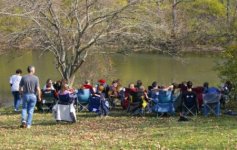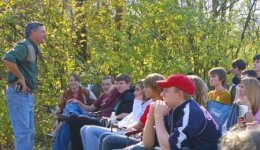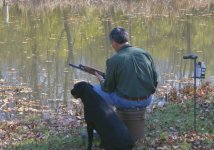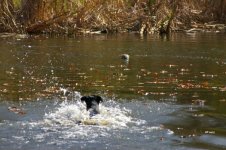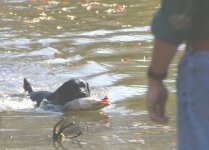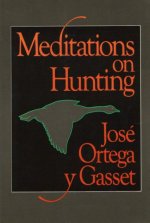Like Lee said, there are lots of different perspectives.
I'd like to share an excerpt from a letter I use with an elective class at our high school called
Words From the Wild. It sums up my thoughts on waterfowl hunting pretty well. The guy who started this class 10 years ago is the chairman of the English Department and a dedicated outdoorsman. His class exposes the kids to some classic literature on the outdoors (everything from
Sand County Almanac to
A River runs Through It to
Tales of the Old Duck Hunters), and provides them some great "hands on" experiences - fly casting, fly tying, river float trips, conservation projects, etc. Each semester, as part of the unit he does on hunting, I get invited to bring my Lab to put on a retriever demo and talk about the retriever breeds and how they're trained for waterfowl hunting. We do a live demo at a pond in a park behind the school, complete with wingers, shooting (12 ga poppers), and a simulated hunt-test triple with a blind retrieve, poison bird, etc. Usually, I'll bring in decoys and other gear for the kids to see. We even towed the boat in with the blind up once.
For the most part these are suburban kids who have had little or no exposure to hunting, shooting, & working dogs (didn't used to be that way when our community was mostly family farms instead of subdivisions). They come away with a whole new outlook; yet the discussions of hunting, as well as the questions they pose, get to be very interesting at times. Let's just say I get to field some challenging questions. Overall, the dogs are great ambassadors and over the years have won over a lot of youngsters who are awed by how they work, and who come to appreciate the perspective I ask them to consider.
Here's part of the letter the kids get a week or so before we do the demo's:
".....I first became involved with retriever training and waterfowl hunting through my friendship with a professional gun-dog trainer & breeder, the late Lewis Craig of Lebanon, Ohio. Lew, who was some 35 years my senior, became the mentor who taught me all the foundational skills necessary for training retrievers. In addition, he introduced me to the unique culture, traditions, customs, and ethical codes that surround upland-bird and waterfowl hunting. This history is one steeped in the “split-rail values,” man-earth relationship, and self-imposed ethical restraints that you will no doubt read about, discuss, and debate during the course of the WFTW class.....
...In the mid-1970’s, my fascination with the “ropes & the tools” of waterfowling led me to take up the carving of my own hunting decoys. In time, I moved on to the sculpting of more intricately researched, detailed, and realistic bird carvings. Over the years, I have had the opportunity to give carving & painting demonstrations and publish instructional articles on carving. On a number of occasions, The Museum of Natural History, Audubon Society, Ohio Department of Natural Resources, Hamilton County Parks, and many conservation organizations have invited me to display my work and speak. I continue to make the decoys I hunt with, and thoroughly enjoy this woodcraft associated with my hunting....
...I mention all this because I want you to realize that there are endeavors connected to sport-hunting which carry with them a sense of fulfillment completely apart from the transitory end- result they bring (the taking of game). Unlike the utilitarian hunting of our forefathers, sport- hunting somewhat reverses the means-to-an-end order that characterized the subsistence hunting of the historical past. I believe that a valuable element of the hunting experience is in its ability to link us to this past and the connection with wild things that modern life has distanced us from. In our times, the taking of game is not the modern hunter’s singular focus, and I’d like to believe that what should stir the interest of today’s hunter is everything necessary to achieve that end. For example, what I seek as a hunter is largely concerned with attempting to achieve the end result while being immersed in the related sets of skills and experiences that make up the process. Making the decoys I hunt over, training retrievers, developing skills calling waterfowl, practicing marksmanship, seeking knowledge about the birds I hunt, facing the elements while using prudent judgment, choosing to limit factors that may give me an unfair advantage, demonstrating self-imposed ethical conduct, sharing time afield with family and good friends - all become as (or more) important than the end result....
...Perhaps Jose Ortega Y Gasset, Spain’s leading philosopher of the 20th century, summed it up best when he wrote in his classic work,
Meditations on Hunting:
'... one does not hunt in order to kill; on the contrary, one kills in order to have hunted.' "
